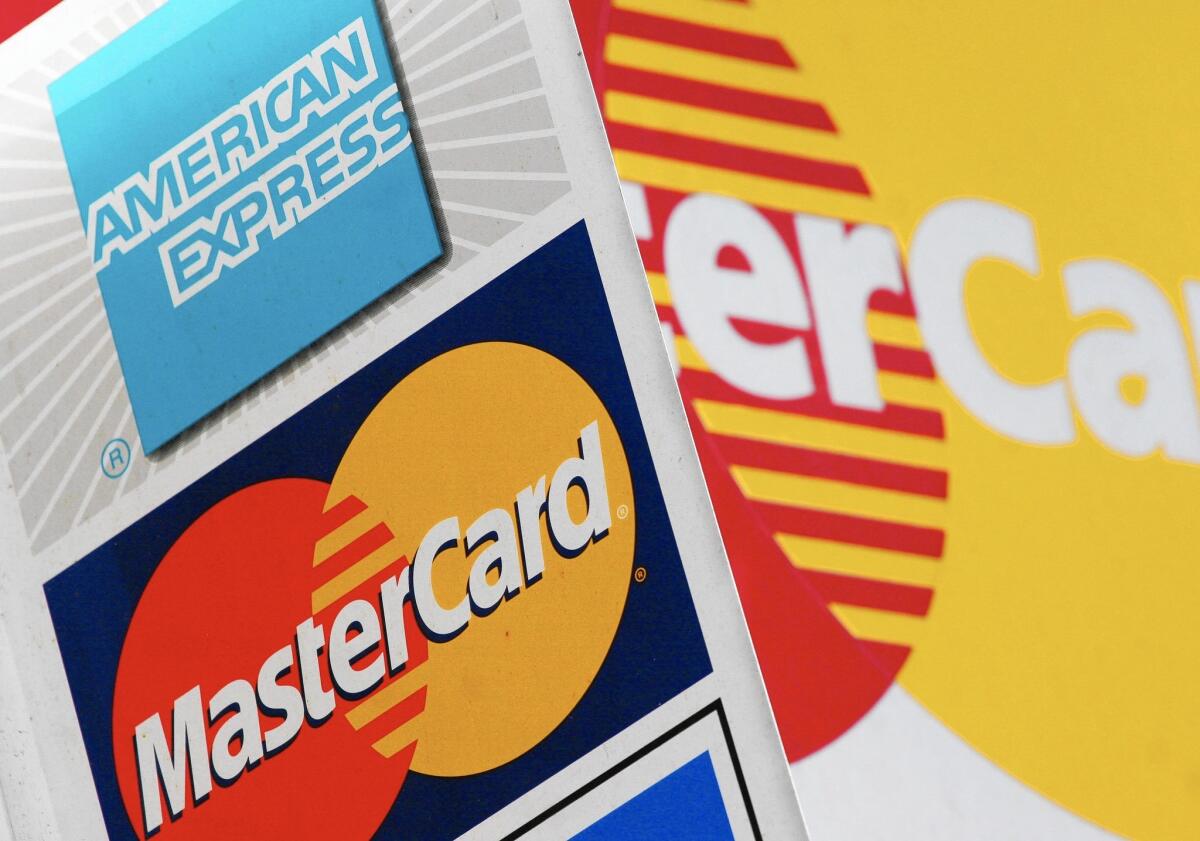Credit card issuers shouldn’t bully customers into arbitration clauses

- Share via
Credit card companies say you can’t sue them and you can’t join other customers in suing them, and if you don’t like it, tough.
Federal regulators finally have reached the obvious conclusion: That’s not fair.
The Consumer Financial Protection Bureau has released a study showing that so-called arbitration clauses in credit card service contracts frequently prevent consumers from having a grievance adequately addressed.
“These arbitration clauses restrict consumer relief in disputes with financial companies by limiting class actions that provide millions of dollars in redress each year,” said Richard Cordray, director of the watchdog agency.
“Now that our study has been completed, we will consider what next steps are appropriate,” he said.
You don’t have to be Sherlock Holmes to deduce that he’s talking about new rules for the industry.
Arbitration allows businesses and customers to sidestep the court system and have a dispute resolved by an independent arbitrator who listens to what both sides have to say.
The problem, consumer advocates say, is that arbitrated settlements often favor businesses. Denying consumers the right to sue thus prevents people from seeking an alternative — and possibly more advantageous — means of solving a problem.
“Big banks and financial predators are using fine-print terms in contracts as an effective license to steal,” said Christine Hines, consumer and civil justice counsel at the advocacy group Public Citizen.
It’s not just banks and card issuers, although that’s the particular bailiwick of the Consumer Financial Protection Bureau. Arbitration clauses also are routine features of contracts for phone, cable and insurance companies, among others.
Businesses love arbitration clauses. Not only do they prevent people from suing on an individual basis, they block them from joining class-action lawsuits on behalf of potentially thousands of customers.
When relatively small amounts of money are involved — a questionable $5 fee, say — it’s not worth it to go to court. A class-action lawsuit, however, can hold a company accountable by allowing many customers to band together.
Arbitration is also preferred by businesses because settlements often are limited and because professional arbitrators, whose fees are typically paid by the company in a dispute, tend to side with their corporate sugar daddies.
A 2007 report by Public Citizen found that over a four-year period, arbitrators ruled in favor of banks and credit card companies 94% of the time in disputes with California consumers.
That’s not to say arbitration should be avoided at all costs. There needs to be a way to resolve disputes outside the congested court system, if both sides prefer.
“Arbitration makes it possible for American consumers to resolve disputes in a cost-effective, fair and timely manner that often benefits all parties involved,” said Richard Foster, senior vice president of legal and regulatory affairs for the Financial Services Roundtable, an industry group.
He urged the Consumer Financial Protection Bureau “to continue working with the industry to educate consumers about this important benefit.”
The problem with arbitration clauses is that they force people to go down this road, rather than let them choose a preferred means to settle a complaint.
“That’s a really big deal,” Public Citizen’s Hines told me. “You’re being denied your constitutional right to go to court.”
The U.S. Supreme Court ruled in a 5-4 decision in 2011 that all businesses can include arbitration clauses in their contracts.
However, the same financial reform law that created the Consumer Financial Protection Bureau in 2010 gave it authority to “prohibit or impose conditions or limitations on the use” of arbitration clauses for credit cards, checking accounts, payday loans and other financial services.
The agency’s study found that as many as 80 million U.S. credit card customers are subject to arbitration clauses.
The study showed that arbitration is much better for businesses than for consumers. Only 20% of cases resolved in consumers’ favor from 2010 to 2011 resulted in relief being paid, according to the study, while 93% of cases resolved in favor of companies led to payments.
More strikingly, the study found that when consumers prevailed in arbitration, they were awarded an average of 57 cents for every dollar claimed. But when companies prevailed, they received 98 cents on the dollar.
Sen. Al Franken (D-Minn.) introduced the Arbitration Fairness Act last year. It would prohibit forced arbitration in consumer disputes, as well as employment, antitrust and civil-rights cases.
It’s a smart bill, although its chances of being passed by the Republican-controlled Congress are slim to none. New regulations from the Consumer Financial Protection Bureau are therefore the best hope to address arbitration clauses in industries under its jurisdiction.
The Philadelphia law firm Ballard Spahr, which focuses on defending banks from consumer lawsuits, said it appears the bureau has “set the stage for a rulemaking that will not be favorable to the industry,” even though “prior studies have overwhelmingly concluded that consumers do in fact like arbitration.”
If so, arbitration should stand on its own merits. But that’s not the case.
By requiring that consumers accept arbitration, businesses have demonstrated that this is their preferred means of problem solving, which should be a red flag to anyone expecting a fair process.
Credit card issuers and lenders have every right to encourage customers to arbitrate rather than sue.
However, they have no right to hold a gun to people’s heads. That’s not dispute resolution.
It’s bullying, pure and simple.
David Lazarus’ column runs Tuesdays and Fridays. he also can be seen daily on KTLA-TV Channel 5 and followed on Twitter @Davidlaz. Send your tips or feedback to david.lazarus@latimes.com.
More to Read
Inside the business of entertainment
The Wide Shot brings you news, analysis and insights on everything from streaming wars to production — and what it all means for the future.
You may occasionally receive promotional content from the Los Angeles Times.










